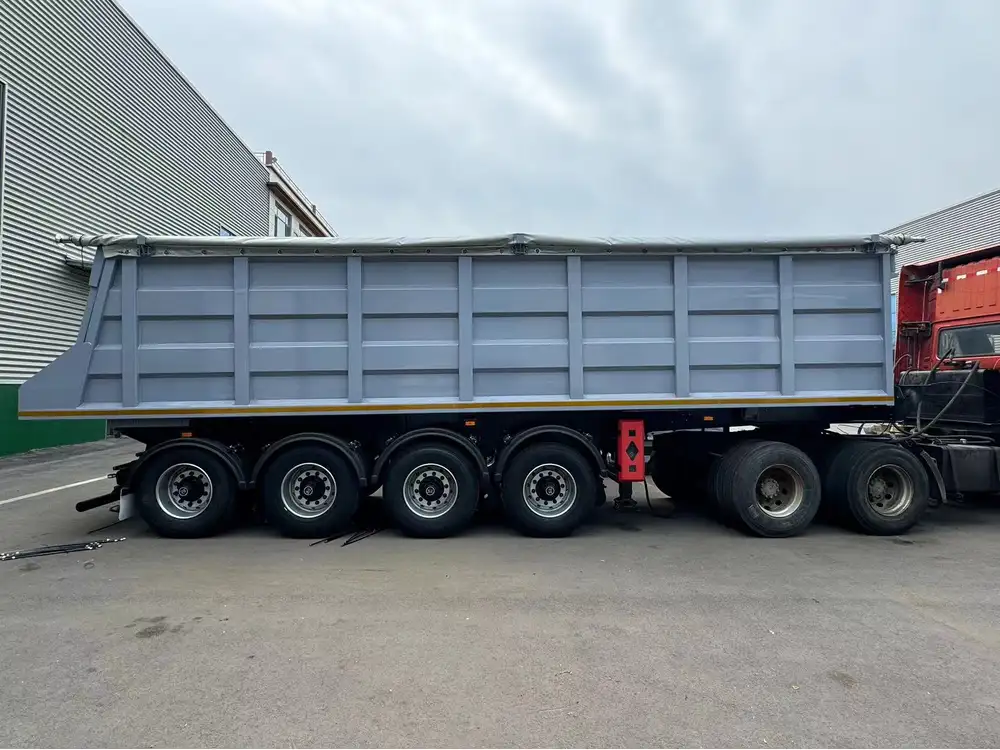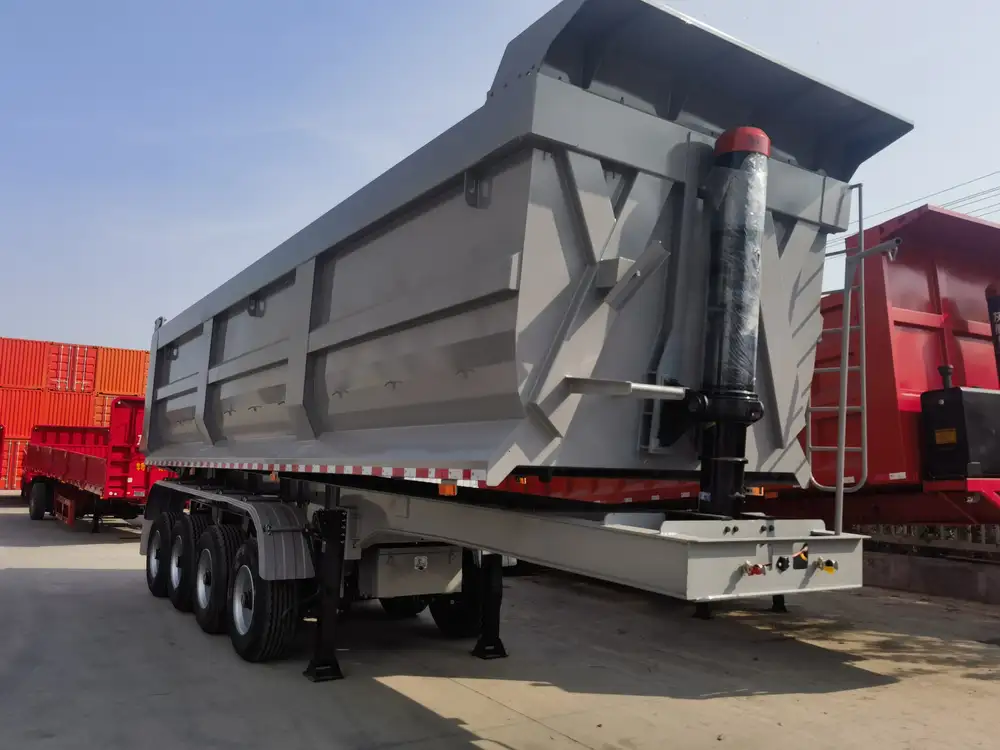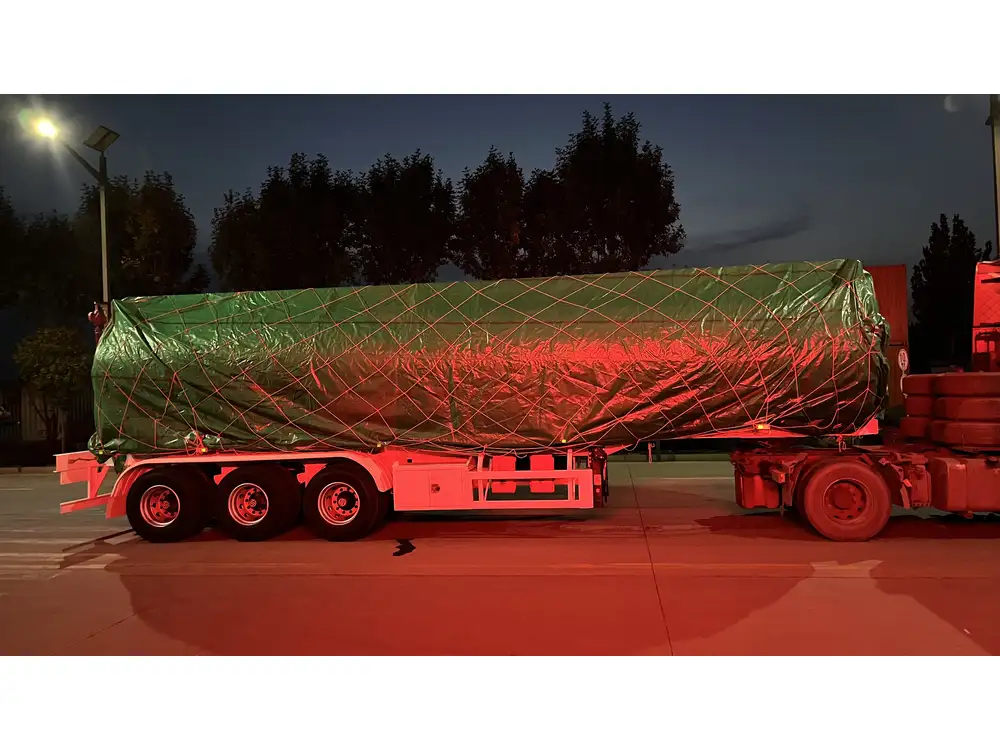What is a Semi Dump Trailer Truck?
A semi dump trailer truck is an essential piece of equipment in the transportation and construction industries. It is designed to transport loose materials, such as sand, gravel, or demolition waste, from one location to another. The semi dump trailer features a powerful hydraulic system that raises the trailer’s bed, allowing for efficient unloading of cargo at the push of a button. Unlike standard dump trucks, semi dump trailers are typically used in conjunction with a tractor unit, maximizing payload capacity and maneuverability on the road.
Key Components of a Semi Dump Trailer
| Component | Description |
|---|---|
| Trailer Frame | Constructed from high-strength steel or aluminum, providing durability and support for heavy loads. |
| Hydraulic System | Utilizes hydraulic cylinders to lift and lower the trailer bed quickly and efficiently. |
| Tipping Mechanism | The pivoting mechanism that allows the bed to tilt, facilitating easy unloading of materials. |
| Suspension System | Designed to support heavy loads and provide a smooth ride, often using leaf springs or air suspension. |
| Wheels and Tires | Heavy-duty wheels and tires that can withstand rough terrains and carry substantial weight. |

Advantages of Using a Semi Dump Trailer
Increased Payload Capacity: Semi dump trailers can carry a larger volume of materials compared to standard dump trucks, making them ideal for high-volume hauling tasks.
Efficiency: The hydraulic lifting system allows for quick and easy unloading, significantly reducing downtime on construction sites or material transfer points.
Versatility: These trailers can be employed for various applications, including construction, mining, agriculture, and landscaping. Their adaptability makes them a preferred choice for many industries.
Cost-Effective: By enhancing loading and unloading efficiency, semi dump trailers can contribute to lower operational costs over time.
Road Compatibility: Designed to be towed by standard tractor units, semi dump trailers maintain excellent maneuverability on both highways and off-road conditions.
Choosing the Right Semi Dump Trailer
When selecting a semi dump trailer, several critical factors should be considered to ensure you choose a model that fits your specific needs.
Load Capacity Requirements
Understanding the maximum load capacity required for your operations is vital. Semi dump trailers range in capacity from 14,000 to 45,000 pounds. Thus, selecting a model that meets your load needs while adhering to road weight regulations is crucial.

Material Type
The type of materials transported can impact the choice of semi dump trailer. For example, trailers designed for bulk materials like gravel may have a different design than those meant for lighter materials such as sand.
Trailer Length and Configuration
Semi dump trailers come in various lengths, typically ranging from 24 to 40 feet. The configuration, including the number of axles, also affects stability and load distribution. A trailer with more axles can carry heavier loads and provide better road stability.
Build Quality and Material
High-quality construction from durable materials is vital for longevity and performance. Aluminum trailers are lighter and resist corrosion but may cost more. Steel trailers are heavier but provide added strength for extreme conditions.

Hydraulic System Specs
The efficiency of the hydraulic system is crucial for smooth operation. Look for trailers with dual hydraulic cylinders for better stability during loading and unloading.
Compatibility with Tractor Units
Ensure that the semi dump trailer is compatible with your tractor unit in terms of hitch type, weight distribution, and braking performance. Checking the compatibility aids in avoiding safety hazards during transportation.
Maintenance of Semi Dump Trailers
To maintain optimal operation and longevity of semi dump trailers, regular maintenance checks are essential. This ensures the truck remains in prime condition, minimizing the risk of breakdowns during operation.

Regular Inspections
Conduct routine inspections of the hydraulic system, including checking for leaks and ensuring the fluid levels are sufficient. Pay attention to the trailer’s frame for any signs of wear, rust, or damage.
Tire Maintenance
Proper tire pressure and tread depth must be maintained. Since semi dump trailers often operate in rugged conditions, checking for any signs of wear and tear can avert potential failures while on the road.
Brake System Checks
Brakes are crucial for safety. Regular checks on brake pads, cables, and hydraulic components will ensure effective stopping power.

Clean Out the Bed
After unloading, cleaning the bed promptly can prevent rusting and accumulation of debris that can lead to further damage or corrosion.
Professional Servicing
Engaging a professional to perform regular service checks can help detect issues before they become significant problems. This is particularly essential for the hydraulic and mechanical systems of the trailer.
Conclusion
In summary, semi dump trailers represent a versatile and efficient solution for transporting loose materials across various industries. Their robust design, coupled with hydraulic technology, allows for swift unloading, which enhances operational productivity. Choosing the right semi dump trailer involves considering factors such as load capacity, material types, build quality, and maintenance routines to ensure long-lasting performance. Regular inspections and professional servicing play a vital role in maintaining these trailers, thereby extending their operational life and ensuring safety on the road.
By taking into account all these intricate details, one can confidently navigate the procurement of a semi dump trailer that aligns well with specific operational needs, setting the stage for a successful transportation and construction journey.
Feel free to modify any sections or add specific details related to your products to further personalize the content.



